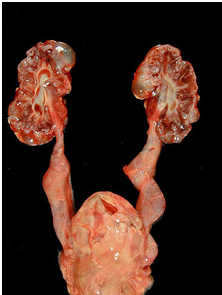Acute Kidney Failure Symptoms, Causes, Diagnosis and Treatment

What is Acute Kidney Failure?
Acute kidney failure, as the name states is the speedy loss of the kidney’s ability of performing which includes:
Help balancing the electrolytes and fluids in a body and removing waste from it.
In addition to this, here the word ‘speedy’ means losing the kidney’s ability in less than two days.
What are the possible causes of acute kidney failure?
There tend to be numerous possible causes of acute kidney failure. They include:
- Autoimmune kidney disease.
- Clotting of blood due to cholesterol (known as cholesterol emboli)
- Acute tubular necrosis.
- Certain disorders that tend to cause clotting inside the blood vessels of the kidneys.
- Urinary tract blockage.
- Reduced blood flow because of extreme low blood pressure that may result from surgery, septic shock, serious illness, hemorrhage, injury, burns and dehydration.
- Certain complications in pregnancy including placenta previa and placenta abruption.
- Certain infections that tend to injure your kidney directly for example septicemia and acute pyelonephritis.
What are the Symptoms of Acute Kidney Failure?
Symptoms of the condition include vomiting or nausea (can last for some days), high blood pressure, hand tremor, sense metallic taste in your mouth, persistent hiccups, nosebleeds, bloody stools, bruising easily, decreased appetite, shortness of breath, breath odor, seizures, prolonged bleeding, changes in mood or mental status, fatigue, sluggish and slow movements, decreased sensation particularly in the feet or hands, swelling (because of the fluid your body is keeping in) mostly in the legs, ankles and feet, flank pain (particularly between the hips and ribs) and urination changes ( completely stopped urines/ little urine / too much urination at night).
How can Acute Kidney Failure be Prevented?
Acute kidney failure can be prevented if you treat disorders like high blood pressure.
What are the alternative names for Acute Kidney Failure?
Alternative names for acute kidney failure are acute renal failure, acute kidney injury, renal failure and kidney failure.
What are the potential complications?
Fluid buildup (in the chest that can trigger shortness of breath), muscle weakness, chest pain, kidney damage permanently and death are few serious and life threatening complications of AKF.
What are the risk factors?
The conditions which can increase the risk of AKF include:
- Diabetes.
- Advanced age.
- Heart failure.
- Liver diseases.
- Kidney diseases.
- High blood pressure.
- Blood vessels blockages of your legs or arms. (Peripheral artery disease).
Acute Kidney Failure Diagnosis
In case the symptoms tend to suggest the patient have AKF, the doctor can recommend procedures and tests in order to verify the diagnosis. Such can include urine tests, blood tests, urine output measurements, imaging tests (CT and ultrasound) and taking a kidney tissue as a sample for testing.

Acute Kidney Failure Treatment
The treatment normally requires the stay in hospital. The primary process of the treatment involves the doctor to identify the injury or illness which initially damaged the kidneys. In addition to this, the doctor will work in order to prevent the complications, thus allowing time for the kidneys to heal. The treatments which can help to prevent certain complications include:
- Medications that can control and manage blood potassium:
The doctor can prescribe sodium polystyrene sulfonate, calcium or glucose (kionex, kayexalate) in order to prevent high levels potassium accumulation in the blood. - Treatments that can balance the fluids amount in the blood:
In case AKF is triggered due to lacking fluids in the blood, the doctor can suggest intravenous (IV) fluids in the case. - Medications that can restore the calcium levels in the blood:
Infusion of calcium can be recommended by the doctor in case the calcium level in the blood drops quite low. - Dialysis in order to remove the toxins from the blood:
Dialysis can be suggested by your doctor in order to remove excess fluids, potassium and toxins from the body while the kidneys heal.
Related Articles:
Kidney Stones Symptoms, Causes, Diagnosis and Treatment
Polycystic Kidney Disease Symptoms, Causes, Diagnosis and Treatment
Chronic Kidney Disease Symptoms, Causes, Diagnosis and Treatment
Kidney Cancer Symptoms, Causes, Diagnosis and Treatment
Kidney Infection Symptoms, Causes, Diagnosis and Treatment
Kidney Cyst Causes, Symptoms, Diagnosis and Treatment
Kidney Dysplasia Causes, Symptoms, Diagnosis and Treatment
By : Natural Health News




